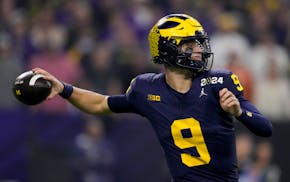Glen Perkins is a sabermetrician. He belongs to a sect that often questions, even ridicules, traditional baseball thinking.
Many sabermetricians believe that the role of the closer is overrated or unnecessary, arguing that a team's best reliever should be used in the most crucial situation arising during a game, not saved for the ninth inning and what might be an easier task.
Perkins is a big-league closer. If Perkins the sabermetrician managed the Twins, would Perkins the closer have a job?
''Uh,'' Perkins said, laughing. ''I'll plead the fifth.''
In the ongoing baseball culture war between intricate metrics and gut feelings, Perkins has learned to listen to his gut.
''I have a unique perspective,'' he said Thursday afternoon. ''I understand that side of the game, the numbers. I also understand what it's like to be down there, in the bullpen. I know people want to say that you can plug anyone in anywhere, that the stats will translate. But there are guys who can do it and guys who can't.
''There are people who have been able to pitch in the eighth who can't do it in the ninth. There are guys who can pitch in non-pressure situations really well. We're not just numbers. We're not just pitchers who can do any job. I think that knowing when you're going to go in is a big contributor to having success.''
Old-school thinkers, like Twins manager Ron Gardenhire, believe in defined roles.
Now that Perkins performs in a defined role, he matriculates at the old school.
''Part of the reason we're in the bullpen is we don't have the stuff to start,'' Perkins said. ''Or, like in my case, maybe I had the pitches but I didn't have the mind-set to go out there inning after inning and keep that focus. I can focus for three outs, or four or five.
"If I had to be prepared to go in the game anywhere from the fifth through the ninth, that takes a lot of mental fortitude that I don't think I have, and I think a lot of guys down there don't have. That's really hard to do. I think I understand how it works when you look at the numbers. You want to use your best reliever in the highest-leverage situations. But every out from 1-through-27 is really important. Let's say you want to use your closer in the seventh because it's an important situation and other guys weren't doing the job. So now you're going to ask guys who were struggling in the seventh to pitch in the ninth?
''You have to get all the outs and the easiest way to do that is to say, 'You're pitching here and you're pitching here,' because we're creatures of habit.''
Entering Thursday's game, Perkins had saved the first two games of the Phillies' series.
He had converted 27 of his last 30 save opportunities, and was 15-for-17 with a 2.55 ERA this season. He is comfortable and thriving.
Perkins uses sabermetrics to salve the psychic wound of a blown save, to seek perspective on how a bad pitch or bad week should be overwhelmed by a season-long body of work. He doesn't use numbers to prepare himself to pitch.
''The only thing I analyze when I'm out there is what stuff I have and what the hitter is doing,'' he said. ''All the numbers, all the stuff that I love, doesn't play when you're on the field. None of that stuff is a scouting tool for a player facing another player.''
Managers have been ridiculed for years for relying on closers, who pick up easy saves and large contracts because they pitch in the ninth instead of the sixth.
Perkins might have been doing the ridiculing years ago. Now he relaxes in the bullpen, knowing the phone call will come at a predictable time and call him into a situation for which he has prepared himself.
''If I were a manager, I would probably construct my bullpen in the same way we have ours constructed, because I know we can't do what sabermetricians want us to do,'' Perkins said. "We just can't.''
Jim Souhan can be heard weekdays
at noon and Sundays from 10 to noon on 1500 ESPN. His Twitter name is @SouhanStrib. jsouhan@startribune.com
Jim Souhan • 612-673-4503

Souhan: Wolves fans made Game 1 special. Now bring on Game 2.

Souhan: Should Vikings even consider McCarthy in NFL draft?

Souhan: NAW erases Suns' lead, Game 1 advantage with big performance

Souhan: This is KAT's chance to prove Flip Saunders was right


